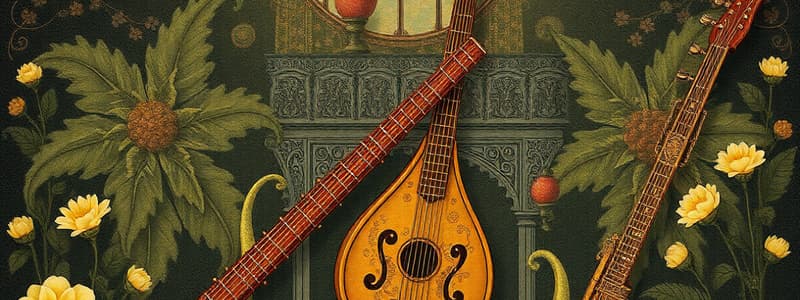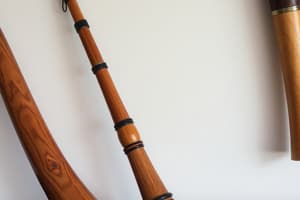Podcast
Questions and Answers
Which wind instrument is known to have been played in celebrations and weddings?
Which wind instrument is known to have been played in celebrations and weddings?
- Surnai (correct)
- Shawm
- Bassoon
- Flageolet
Which instrument is considered the precursor to the modern oboe?
Which instrument is considered the precursor to the modern oboe?
- Zummara
- Surnai
- Flageolet
- Shawm (correct)
Where did the instrument that uses multiple bamboo strips and produces music known as Sikuri originate?
Where did the instrument that uses multiple bamboo strips and produces music known as Sikuri originate?
- France
- Egypt
- South America (correct)
- Germany
Which instrument has a double pipe system allowing players to cover holes simultaneously?
Which instrument has a double pipe system allowing players to cover holes simultaneously?
Which instrument is described as producing a bird-like sound?
Which instrument is described as producing a bird-like sound?
Which of the following instruments is part of the double-reed category and has the lowest pitch in its family?
Which of the following instruments is part of the double-reed category and has the lowest pitch in its family?
Which instrument originates from Egypt and is believed to date back to around 2700 BCE?
Which instrument originates from Egypt and is believed to date back to around 2700 BCE?
In which century did the flageolet become a popular instrument?
In which century did the flageolet become a popular instrument?
Which instrument consists of pieces tied together, forming one of the largest in its family?
Which instrument consists of pieces tied together, forming one of the largest in its family?
What is the region of origin for the shawm?
What is the region of origin for the shawm?
Flashcards
Flageolet
Flageolet
A wind instrument from the 16th century, originating in France, with single or double pipes often used for dance accompaniment.
Shawm
Shawm
A wooden wind instrument from the late 13th century in Germany, size-varied, ancestor of the modern oboe.
Zummara
Zummara
An ancient Egyptian double clarinet dating back to c. 2700 BCE, with two pipes and a single reed.
Surnai
Surnai
Signup and view all the flashcards
Bassoon
Bassoon
Signup and view all the flashcards
Contrabassoon
Contrabassoon
Signup and view all the flashcards
Panpipes
Panpipes
Signup and view all the flashcards
Sikuri
Sikuri
Signup and view all the flashcards
Double reed
Double reed
Signup and view all the flashcards
Woodwind family
Woodwind family
Signup and view all the flashcards
Study Notes
World of Wind Instruments
-
Zummara:
- Ancient Egyptian instrument, dating back to 2700 BCE
- Consists of two parallel pipes connected together
- Each pipe has a single reed
- Played by covering holes with fingers, allowing for different notes to be created
-
Surnai:
- Pre-13th-century Mongolian folk instrument
- Loud oboe-like instrument
- Made of wood, features seven holes and thumb hole for additional control
- Portable and popular with nomadic people, often played at celebrations like weddings
-
Flageolet:
- 16th-century French instrument
- Can have a single or double reed
- Popular accompaniment for 17th and 18th-century dances
- Played using both hands to generate a bird-like sound
-
Shawm:
- 13th-century German instrument
- Made from a single piece of wood, in various sizes
- Precursor to the modern oboe
- Various sizes and different tones, allowing for a wider range of different musical styles
-
Bassoon:
- 1800s German instrument
- Constructed as a double reed using two pieces of cane
- Largest instrument in the woodwind family, producing the lowest pitch
- Contra-bassoon specifically, a specialized variant, being the lowest in pitch
-
Panpipes:
- Prehistoric South American instrument
- Consists of various-length bamboo strips woven together
- Variety of strips allows for different sounds
- Known as "sikuri" in some South American cultures
Studying That Suits You
Use AI to generate personalized quizzes and flashcards to suit your learning preferences.




